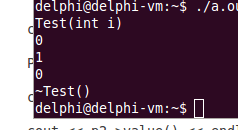1.智能指针(即一个功能完善的类)
a.指针生命周期结束时主动释放堆空间
b.一片堆空间最多只能由一个指针标识
c.杜绝指针运算和指针比较
解决方案:
a.重载指针特征操作符("->"和"*")
b.只能通过成员对象重载(=, [], ())
c.重载函数不能使用参数
d.只能定义一个重载函数
注意:智能指针只能用来指向堆空间中的对象或变量
eg:
#include <iostream>
#include <string>
using namespace std;
class Test
{
int i;
public:
Test(int i)
{
cout << "Test(int i)" << endl;
this->i = i;
}
int value()
{
return i;
}
~Test ()
{
cout << "~Test()" << endl;
}
};
class Pointer
{
Test* mp;
public:
Pointer (Test* p = NULL) //传入一个地址
{
mp = p; //把传入的地址赋值给mp
}
Pointer (const Pointer& obj) //注意:一个空间只能由一个指针访问
{
mp = obj.mp;
const_cast<Pointer&>(obj).mp = NULL; //指针赋值完后,这段需置为空
}
Pointer& operator = (const Pointer& obj)
{
if(this != &obj)
{
//delete mp;
mp = obj.mp;
const_cast<Pointer&>(obj).mp = NULL;
}
return *this;
}
Test* operator -> () //调用->后会返回一个Test *指针
{
return mp;
}
Test& operator * () //调用*后会返回一个Test的引用
{
return *mp;
}
bool isNull ()
{
return (mp == NULL);
}
~Pointer ()
{
delete mp;
}
};
int main()
{
Pointer p1 = new Test(0); //分配一个智能指针(类)调用构造函数时,给它一个地址(地址中的内容为0)。
cout << p1->value() << endl; //p1->value(),(p1 operator ->())->value()。p1指时,返回Test* mp。对象指针。调用它的value()成员函数
//这里两个->一个是重载的版本,一个是内建的版本
Pointer p2 = p1;
cout << p1.isNull() << endl;
cout << p2->value() << endl;
return 0;
}
